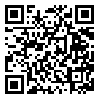Volume 2, Issue 1 (March 2023)
IJER 2023, 2(1): 50-58 |
Back to browse issues page
Download citation:
BibTeX | RIS | EndNote | Medlars | ProCite | Reference Manager | RefWorks
Send citation to:



BibTeX | RIS | EndNote | Medlars | ProCite | Reference Manager | RefWorks
Send citation to:
Kiani F, Amiryan Farsani M, Mehrabi S. (2023). The effectiveness of group dialectical behavior therapy on increasing emotional, communicative, sexual and social-recreational intimacy of depressed couples. IJER. 2(1), 50-58. doi:10.22034/2.1.50
URL: http://ijer.hormozgan.ac.ir/article-1-47-en.html
URL: http://ijer.hormozgan.ac.ir/article-1-47-en.html
1- Assistant Professor, Department of Psychology, Boroujen Branch, Islamic Azad University, Boroujen, Iran , fariba.kiani64@gmail.com
2- MA in Educational Management, Department of Education, Farsan, Iran
3- Assistant Professor, Department of psychology, Kahnuj Branch, Islamic Azad University, Kahnuj, Iran
2- MA in Educational Management, Department of Education, Farsan, Iran
3- Assistant Professor, Department of psychology, Kahnuj Branch, Islamic Azad University, Kahnuj, Iran
Abstract: (2164 Views)
Marital issues and depression commonly manifest within couples, displaying a reciprocal connection. This research aimed to assess the impact of group-based dialectical behavior therapy on enhancing emotional, communicative, sexual, and social-recreational intimacy among couples experiencing depression. Conducted as an experimental study with both experimental and control groups, the research involved 20 couples seeking assistance at counseling centers in Shahrekord (Iran) due to depression. The couples were selected through purposive sampling and then randomly assigned to either the experimental or control group. Utilizing a marital intimacy questionnaire, baseline measurements of marital intimacy were taken for both groups prior to the intervention (pre-test). Following an 11-week intervention comprising 90-minute sessions for the experimental group, post-intervention assessments were conducted for both groups using the same questionnaire (post-test). The data underwent analysis involving descriptive statistics and Multivariate Covariance method. The results indicated that dialectical behavior therapy yielded significant enhancements in emotional, communicative, sexual, and social-recreational intimacy for depressed couples within the experimental group, compared to the control group (P<0.05). The study underscores the meaningful implications of exploring the efficacy of dialectical behavior therapy on various dimensions of intimacy for couples experiencing depression, offering valuable insights into the mental well-being of such couples.
Keywords: Dialectical behavior therapy, Intimacy, emotional, communicative, sexual, social-recreational, depression, couples
Type of Study: Original |
Subject:
Educational Psychology
Received: 2022/12/21 | Accepted: 2023/02/5 | Published: 2023/03/1
Received: 2022/12/21 | Accepted: 2023/02/5 | Published: 2023/03/1
References
1. Baudinet, J., Simic, M., Griffiths, H., Donnelly, C., Stewart, C., & Goddard, E. (2020). Targeting maladaptive overcontrol with radically open dialectical behaviour therapy in a day programme for adolescents with restrictive eating disorders: an uncontrolled case series. Journal of Eating Disorders, 8(1), 1-13. [DOI:10.1186/s40337-020-00338-9]
2. Beck, A. T., Steer, R. A., & Brown, G. K. (1996). Beck Depression Inventory-II. San Antonio, TX: Psychological Corporation. [DOI:10.1037/t00742-000]
3. Bodenmann, G., Atkins, D. C., Schär, M., & Poffet, V. (2010). The association between daily stress and sexual activity. Journal of Family Psychology, 24(3), 271-279. [DOI:10.1037/a0019365]
4. Brazier, J. E., Tumur, I., Holmes, M., Ferriter, M., Parry, G., Dent-Brown, K., & Paisley, S. (2006). Psychological therapies including dialectical behaviour therapy for borderline personality disorder: a systematic review and preliminary economic evaluation. NIHR Health Technology Assessment programme: Executive Summaries. [DOI:10.3310/hta10350]
5. Cameron, A. Y., Palm Reed, K., & Gaudiano, B. A. (2014). Addressing treatment motivation in borderline personality disorder: Rationale for incorporating values-based exercises into dialectical behavior therapy. Journal of Contemporary Psychotherapy, 44, 109-116. [DOI:10.1007/s10879-013-9253-9]
6. Fassbinder, E., Schweiger, U., Martius, D., Brand-de Wilde, O., & Arntz, A. (2016). Emotion regulation in schema therapy and dialectical behavior therapy. Frontiers in psychology, 7, 1373. [DOI:10.3389/fpsyg.2016.01373]
7. Harned, M. S., Korslund, K. E., & Linehan, M. M. (2014). A pilot randomized controlled trial of dialectical behavior therapy with and without the dialectical behavior therapy prolonged exposure protocol for suicidal and self-injuring women with borderline personality disorder and PTSD. Behaviour research and therapy, 55, 7-17. [DOI:10.1016/j.brat.2014.01.008]
8. Iverson, K. M., Shenk, C., & Fruzzetti, A. E. (2009). Dialectical behavior therapy for women victims of domestic abuse: A pilot study. Professional Psychology: Research and Practice, 40(3), 242. [DOI:10.1037/a0013476]
9. Linehan, M. M. (1993). Cognitive-behavioral treatment of borderline personality disorder. Guilford Press.
10. Rathus, J. H., Cavuoto, N., & Passarelli, V. (2006). Dialectical behavior therapy (DBT): A mindfulness-based treatment for intimate partner violence. Mindfulness-based treatment approaches: Clinician's guide to evidence base and applications, 333-358. [DOI:10.1016/B978-012088519-0/50016-2]
11. Telch, C. F., Agras, W. S., & Linehan, M. M. (2000). Group dialectical behavior therapy for binge-eating disorder: A preliminary, uncontrolled trial. Behavior therapy, 31(3), 569-582. [DOI:10.1016/S0005-7894(00)80031-3]
12. Whisman, M. A., & Uebelacker, L. A. (2009). A longitudinal investigation of marital adjustment as a risk factor for metabolic syndrome. Health Psychology, 28(2), 171-175.
Send email to the article author
| Rights and permissions | |
 |
This work is licensed under the Creative Commons - Attribution 4.0 International. |








